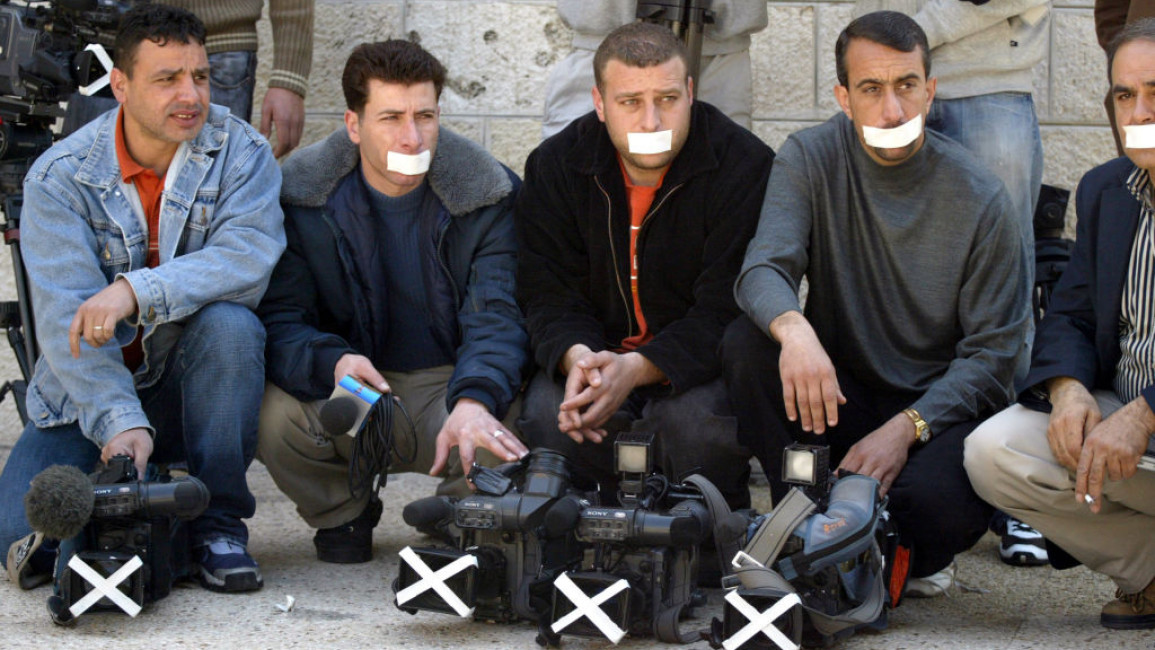World Press Freedom Day: Middle East ranks as most hostile media environment in the world
Journalists in the Middle East work in the most hostile media environment in the world, according to the 2022 World Press Freedom Index published by Reporters Without Borders (RSF) on Tuesday.
Over 50 percent of countries in the Middle East had “very serious” threats to press freedoms based on RSF’s five indicators: political context, legal framework, economic context, sociocultural context, and safety.
The remaining nations had either “difficult” or “problematic” media environments.
#RSFIndex: RSF unveils its 2022 World #PressFreedom Index
— RSF in English (@RSF_en) May 3, 2022
1: Norway🇳🇴
2: Denmark🇩🇰
3: Sweden🇸🇪
16: Germany🇩🇪
24: UK🇬🇧
26: France🇫🇷
42: USA🇺🇸
58: Italy🇮🇹
71: Japan🇯🇵
110: Brazil🇧🇷
134: Algeria🇩🇿
150: India🇮🇳
178: Iran🇮🇷
179: Eritrea🇪🇷
180: North Korea🇰🇵https://t.co/nrqbVRGVUJ pic.twitter.com/WO3izABZ56
Iran, Iraq and Syria were listed among the bottom 10 out of 180 countries globally for press freedoms, according to the index.
Yemen, Egypt, Bahrain, Saudia Arabia and Oman are all featured in the bottom 20.
Palestine, now at 170, had fallen significantly from its ranking the previous year, 133; with a similar sharp decrease witnessed in Oman and Afghanistan.
“We are seeing a very worrying trend in the Middle East,” said Pauline Ades-Mevel, a senior spokesperson from RSF, to The New Arab.
Ades-Mevel listed a number of countries, such as Lebanon which has slipped 23 places, where threats and arbitrary detainment were a constant reality for reporters.
When asked specifically about Palestine, the RSF spokesperson said journalists “were paying a heavy price” for their reporting.
The combined pressure of the Palestinian Authority and harassment by Israeli forces were, she said, precipitating this hostile environment.
Asked about the role of the international community, RSF said this was a "difficult" question to answer and added that its focus was on raising awareness of difficulties on the ground.
Surprisingly, Saudi Arabia and Turkey both improved their press freedom ranking from the previous year, moving by 3 and 4 places respectively.
Ades-Mevel said this was on account of the organisation changing its methodology to “adapt” to the changing media landscape which has become more digitalised.
Don't let them prevent journalists from telling the truth.
— UNESCO 🏛️ #Education #Sciences #Culture 🇺🇳😷 (@UNESCO) May 1, 2022
When #PressFreedom is silenced, when journalists are censored, all our other freedoms & rights are at risk.
➡️ https://t.co/4j1zY20trr #WorldPressFreedomDay pic.twitter.com/iKe8MnDygs
Justin Shilad, a Senior Middle East and North Africa Researcher for the Committee to Protect Journalists, told The New Arab his organisation had witnessed an "ongoing pattern of harassment and detention" against journalists in the region.
Egypt was named as one of the worst jailers in the Middle East, with an estimated 25 reporters behind bars.
When asked about Palestine, Shilad said the bombing of Gaza last year was "devastating" for press freedom and can be seen as part of a "longer trend of impunity" when it comes to targeting journalists. He added that Israeli forces are detaining reporters without charge for longer periods, echoing the repressive climate documented in Saudi Arabia and Egypt.
2022 marks the 20th year of RSF’s World Freedom Index, released on World Press Freedom Day.
The organisation released a statement alongside this year’s rankings acknowledging how increased media “polarisation” had made democracies weaker and fuelled despotic regimes globally.
Michelle Bachelet, UN High Commissioner for Human Rights, paid tribute to the media to mark the day, saying "the courage and determination of journalists...is crucial to ensure we live in democratic, just and peaceful societies".




